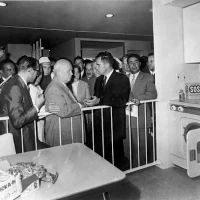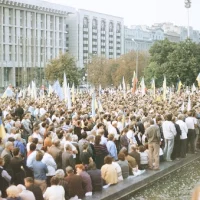It was undoubtedly one of the most unorthodox – and therefore memorable – settings for a major political debate. On July 24th, 1959, the United States opened the American National Exhibition at Sokolniki Park in Moscow. The Soviets and Americans had agreed to hold exhibits in each other’s countries as a cultural exchange to promote… Read More "Nixon vs. Khrushchev — The 1959 Kitchen Debate"
Jordan’s Black September, 1970
In 1972, a group of Palestinian terrorists shocked the world by kidnapping eleven Israeli athletes during the Summer Olympics in Munich. They called themselves Black September. This name has its roots in the infamous “Black September” of 1970: a month of bloody fighting in Jordan between the forces of Jordanian King Hussein bin Talal and… Read More "Jordan’s Black September, 1970"
Kissinger and Lord in China: A How-To Guide for Secret Negotiations
At the height of the Cold War, with the death toll mounting in Vietnam and the split between the USSR and China becoming more and more evident, it became clear to the Nixon Administration that ending the war in Vietnam and opening relations with China could be a two-front victory. However, because of the sensitive… Read More "Kissinger and Lord in China: A How-To Guide for Secret Negotiations"
Watergate – Another Perspective
The Watergate affair was the most controversial political scandal to ever come out of the Oval Office and, along with Vietnam, marked a turning point in Americans’ distrust of the government. On June 17, 1972 five men were arrested as they tried to break into the Democratic National Committee (DNC) headquarters at the Watergate complex.… Read More "Watergate – Another Perspective"
Evacuating Uganda — With Style
From 1971-1979, Uganda was under the control of the mercurial Idi Amin, one of the most brutal military dictators ever to rule in Africa. Towards the end of 1973 it became clear that the United States could no longer maintain its embassy in Kampala and would have to shut it down. Deputy Chief of Mission… Read More "Evacuating Uganda — With Style"
Vietnam, A Look Back
The Vietnam War remains one of the most contentious foreign policy issues in American history. U.S. military involvement was initially justified in view of the domino theory, the widely held belief that a failure to prevent the spread of Communism in Vietnam would ultimately to Communist victories in Laos, Cambodia, Thailand, and the rest of… Read More "Vietnam, A Look Back"
The Fight in Vietnam Arrives at the White House
In the late 1960’s, the United States had become polarized by the Vietnam War, as even many defenders were beginning to question the goals and tactics of the military. One such person was William Watts, who at the time had been promoted to the position of White House Staff Secretary for the National Security Council… Read More "The Fight in Vietnam Arrives at the White House"
Known as the ‘Giant of Africa,’ Nigeria stretches across the continent like a patchwork quilt, sewn together from dozens of historically independent religious, ethnic and linguistic subgroups, all vying for political representation and control. After achieving independence in 1960, the infant nation struggled to maintain a fragile peace as members of the Muslim Hausa-Fulani ethnic… Read More "The Famine in Biafra — USAID’s Response to the Nigerian Civil War"
“With Ukraine, Russia is an empire. Without it, Russia is just another country.” The history between these two is long and often fraught with conflict. Before the current protests in Ukraine over relations with Russia, Ukraine had to fight to free itself from the Soviet Union. Official independence was declared August 24, 1991 and with… Read More "Ukraine’s Push for Independence"
“Our government has evidenced moral bankruptcy”: The Blood Telegram and the 1971 Bengali Genocide
Pakistan after independence was a strange creation: the capital, Islamabad, and most of the power were located in the west while the rest of the country was located far out east, separated by another – and often hostile – country. The Bengalis were poorly treated and scorned by the Pakistanis; in March 1971, the nationalist… Read More "“Our government has evidenced moral bankruptcy”: The Blood Telegram and the 1971 Bengali Genocide"



